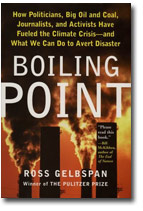Books |
Boiling Point
Ross Gelbspan
By
Published: Jan 01, 2006
Category:
Non Fiction
Boiling Point
Ross Gelbspan
You know the story of the frog and the pot of boiling water. Drop him in and he recognizes the danger fast — he’ll jump out if he can. But put him in a pot of cool water, turn up the heat slowly and he’ll adjust to the incremental change in temperature as long as he can — he’ll die not knowing he was ever in mortal danger.
That second way is how most of us look at the ongoing story of climate change. Yeah, it’s weird. And scary, if you stop to think about it. But you don’t really have to think about it — it’s just one little degree warmer. And besides, what can one person do, anyway?
Well, one person might just read this book.
I read ‘Boiling Point’ because a friend — the Boston-based sculptor Murray Dewart — pushed a copy on me. And not just me. He raised $5,000, bought enough copies for every member of Congress, and shipped them off to Washington. Lord knows how many of our representatives will read this book. Not that it’s not hard to read; it’s written in English, not science. But if you’ve taken money from the energy industry and owe your benefactors, this isn’t a book to help you sleep better.
In fact, it’s a wake-up call. And while wake-up calls are the order of the day — every environmental group or progressive political movement seems to spend of lot of energy getting us to wake up to this crisis or that — I’m here to tell you this is the big one, the one that matters. Face it, if you’re running for the hills with a steadily rising ocean behind you, other issues disappear. Ditto if it’s broiling hot every day and there’s not enough sunscreen in the world to keep your kid’s skin safe. Or….but you know the doomsday scenarios.
What you don’t know, says Ross Gelbspan, is about the perfect storm of forces that have come together to make our ever-warming world just a little hotter. Hostility to the issue from the oil and coal industry — no surprise there. The negativity of the Bush Administration, with two oil men at the helm — ditto. But journalists? And environmental activists? How are they making things worse?
"The news media continue to ignore the biggest story in our planet’s history," says Gelbspan, in a sentence that freaks me out just to retype. "The environmental establishment continues to sugarcoat the truth." Thus this book: "a last-gasp attempt to break through the monstrous indifference of Americans to the fact that the planet is caving in around us."
The fact? Is it proven? There are, says Gelbspan, scientists who don’t think so. And most of them, he notes, are bought and paid for by you know who. The scientists he listens to are, sadly, more troubled: "Climate stabilization requires that humanity cut its consumption of carbon fuels by about 70 percent." And their conclusions are gloomy indeed. "Seventeen of the hottest eighteen years on record have occurred since 1980." British seasons are "increasingly muddled…. People in certain parts of the United Kingdom found they had to mow their lawns all year-round." And so on.
Don’t feel that trading your SUV for a Prius will make a difference — unless we get half our energy from non-carbon fuels by 2018, we’re looking at a much worse problem. Oh, that trade-in is a nice gesture, to be sure, but the challenge is much bigger. The good news: If we confront it, Gelbsman says, the rewards are much bigger than cleaner air and stabilized temperatures.
A sane energy policy would, Gelbspan argues, reduce terrorism by freeing some of our planet’s poorest people from abject poverty — they could work on projects that create clean energy. The deserts of the Middle East could be covered with saltwater pipelines, solar panels and wind farms — resources there for the taking, not drilling. Economies would change; exploitation would lessen as the rich get a bit less rich and the poor become less poor.
But that’s the upside. To get there, we must consciously walk through the valley of the shadow of death — we must get together, hundreds and hundreds of millions of us, and then we must be clear that we won’t compromise, we won’t negotiate, we want a real solution. And then we have to get megaphones into the hands of bright, honest scientists and innovative business executives and environmentalists who see the big picture.
Will that save the planet? Beats wringing out your handkerchief for water and praying to God for deliverance. Beats not knowing what’s happening. Yes, of the available books, you might as well start with this 200-pager with the big print.
To read is sometimes to act. Or to start to. As ever, it’s your choice.
To buy ‘Boiling Point’ from Amazon.com, click here.


